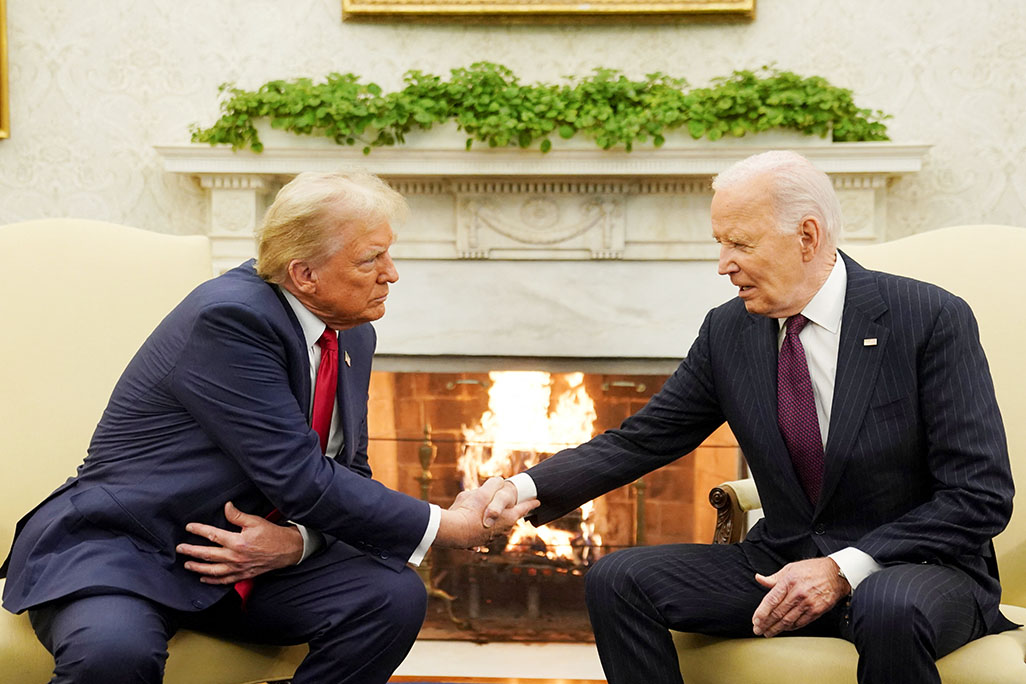President-elect Donald Trump returned to the White House on Wednesday for the first time since winning last week’s election and sat down for talks about the looming transfer of power with longtime political rival President Joe Biden.
“Welcome, welcome back,” Biden told Trump at the start of their meeting in front of a roaring fireplace.
He promised Trump a smooth transition of power and to do all he could “to make sure you’re accommodated.”
“It’ll be as smooth as it can get,” Trump said.
It was a sharp contrast to the criticism the two men have hurled at each other for years. Their respective teams hold vastly different positions on policies from climate change to Russia to trade.
Biden, 81, has portrayed Trump as a threat to democracy, while Trump, 78, has portrayed Biden as incompetent. Trump made false claims of widespread fraud after losing the 2020 election to Biden.
Trump’s motorcade rolled through the heavily guarded White House gate and the former and future Republican president was greeted in the Oval Office by Biden, a Democrat who defeated him in the 2020 election.
Outside on the White House driveway, a massive crowd of journalists gathered in anticipation of the big event.
Trump celebrated his victory earlier in the day with Republicans in the House of Representatives who have a good chance of maintaining control of the chamber as Nov. 5 election results trickle in.
“Isn’t it nice to win? It’s nice to win. It’s always nice to win,” Trump said. “The House did very well.”
Biden, who initially ran against Trump in the 2024 election before stepping aside and endorsing Vice President Kamala Harris as the Democratic nominee, will welcome the former and future president into the Oval Office, a traditional courtesy by outgoing presidents that Trump, a Republican, did not extend when Biden won in 2020.
“He believes in the norms, he believes in our institution, he believes in the peaceful transfer of power,” White House spokesperson Karine Jean-Pierre said of Biden’s decision to invite Trump. She spoke at a briefing for reporters on Tuesday.
Outside the White House gates, signs of the impending power transfer were evident with construction already under way for the stands for VIP guests to sit during the parade that will take place after Trump is inaugurated on Jan. 20.
Although Biden intends to use the meeting to show continuity, the transition itself is partially stalled.
Trump’s team, which has already announced some members of the incoming president’s cabinet, has yet to sign agreements that would lead to office space and government equipment as well as access to government officials, facilities and information, according to the White House.
“The Trump-Vance transition lawyers continue to constructively engage with the Biden-Harris Administration lawyers regarding all agreements contemplated by the Presidential Transition Act,” said Brian Vance, a spokesperson for the Trump transition, referring to the law that governs the transfer of power.
Valerie Smith Boyd, director of the Partnership for Public Service’s Center for Presidential Transition, a non-profit that advises incoming administrations, said the agreement underscores that the United States only has one president at a time and includes pledges to sign ethics pacts not to profit off information provided in the transition.
“That needs to be signed for interaction to begin with federal agencies,” she said. “Everything is hinging on that.”
Meetings with federal agencies aside, Biden and Trump will likely discuss a myriad of topics, including foreign policy.
The outgoing president may urge Trump to back Ukraine in its war with Russia. U.S. support for Kyiv is in question following Trump’s victory over Harris last week, and Trump has pledged to end the war quickly without explaining how.
Jean-Pierre declined to outline discussion points between the two men ahead of their meeting.
The meeting will be the first since the two men’s debate in June. Biden’s poor performance then heightened concerns about his age among fellow Democrats and led to his departure from the race. Harris became the Democratic nominee instead, running a truncated campaign that ended in her loss.







Click here to change your cookie preferences